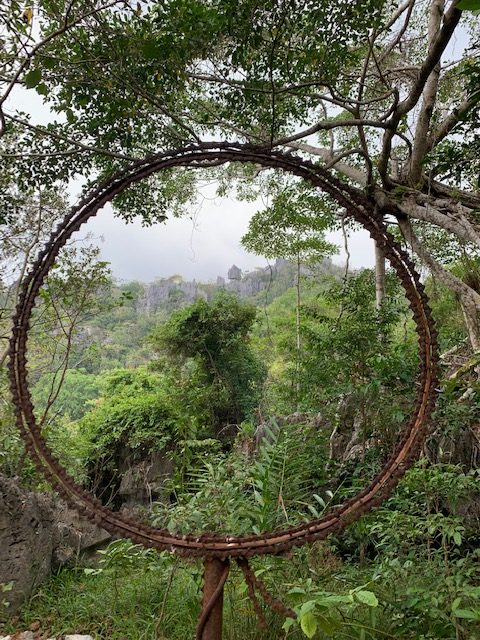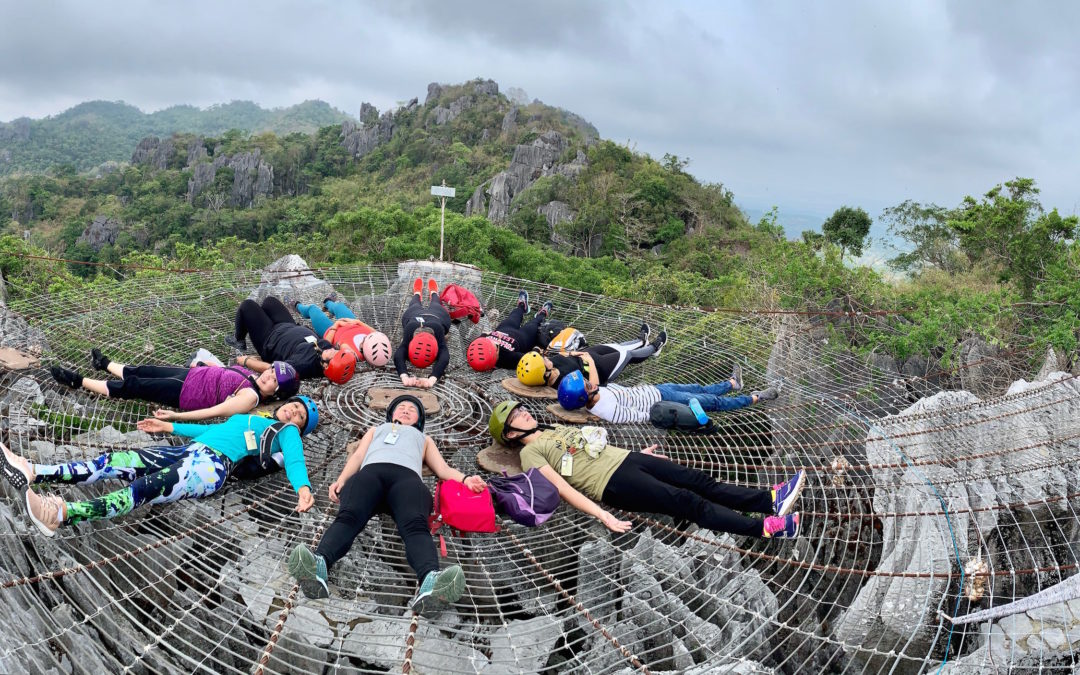Guilty!
I’m guilty of spending too much time indoors and sitting in front of my laptop. Bea, the studio manager at Rebel Yoga Manila, observed that it was like I hadn’t moved from the spot she last saw me in before leaving the studio for errands. I was in front of my laptop when she left and I was still there when she returned.
That’s why this year I revel spending time outdoors. I am especially happy and grateful that my kundalini “soul tribe” found the time to get together and join me at the Masungi Georeserve to forest bath. The site is 1.5-hours away north of Manila.
Forest bath or “shinrin-yoku” as a cornerstone of preventive health care and healing.

Remnants of the chains of the chainsaw that illegal loggers used to cut down trees.
Sinrin-yoku is a Japanese practice to spend time in the forest. In 2009, Dr. Qing Li, a professor at Nippon Medical School in Tokyo has discovered that our immune cells, or “natural killer cells,” which fight cancer, increase during frequent visits to forests. This is due to phytoncide which is the aroma emitted by trees and plants in the forest to protect themselves from harmful insects and germs. Li said that exposure to the forest and inhaling phytoncide improves our immune system function and helps in cancer prevention.
Nature-Deficit Disorder is now a new term for forest bathing. The term is named by Richard Louv, a child advocacy expert and author of the Last Child in the Woods: Saving Our Children from Nature-Deficit Disorder. He documented studies indicating that “without regular immersion in nature, we can suffer physical and emotional distress, including anxiety, depression and obesity.” This is gaining ground not only for children but also as a treatment for United States-veterans suffering from mental-health disorders. As of May 1, 2019, a bill called “the Outdoor Recreation Therapy for Veterans Act” (HR 2435) was introduced to make outdoor recreation an official treatment option.
Matilda van den Bosch and Andreas Early this year, Meyer-Lindenberg of the School of Population and Public Health and Department of Forest and Conservation Sciences, of the University of British Columbia published their findings on the mental hazards of city living. One of the premises is that we can be harmed by things we may not even realize we’re being exposed to, like lead or air pollution.
In their review they wrote, “Physical diseases consistently associated with air pollution—such as cardiovascular diseases, diabetes, and asthma —may, through comorbidity, increase the prevalence of depression in air-polluted environments. Depression also shows comorbidity with other neuropsychiatric disorders that are associated with air pollution, such as cognitive disturbance and Alzheimer disease. In addition, air pollution may cause oxygen deficiency, which can alter a variety of neural systems, including serotonin synthesis Some studies have found an association between hypoxia and suicide.”
Strongly recommended: plan at least a day trip out of the city and head to a forest.

We don’t have enough trees in the city to generate the phytoncides we need. Dr. Li said that two hours in the forest is enough to boost your immune system, increase energy, decrease anxiety, depression and anger, and reduce stress and bring about a state of relaxation.
We did more than four hours in Masungi where we immersed our five senses listening to the cicadas, feeling the breeze of mountain air, seeing different hues of greens, soaking vitamin D from the sun and most of all, taking in the zingy smell of phytoncides. The recommendation is to be in the forest regularly, as often as once a week.
Living, healing, and blooming on the road.
It will be 24/7 of phytoncides in Slovenia for me for another gong training with the Grand Master Don Conreaux. Watch out for the 12-day Frog challenge starting May 25. There will be two winners for the next four-week class series in June to Build your Business Intuition.
In case I don’t see you any time soon, do go out and look for that green space. Feel the difference, and find your peace.
In loving service,
Rosan



Trackbacks/Pingbacks